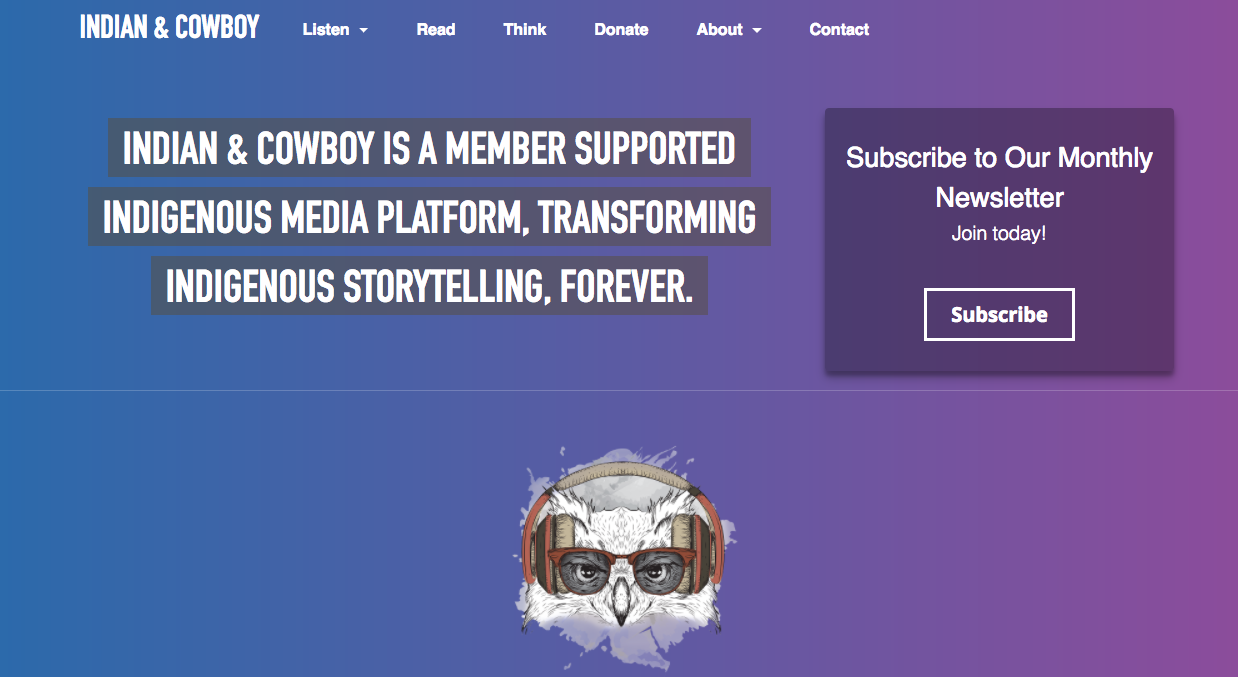This story was funded by the J-Source Patreon campaign.
By Meagan Gillmore
Ryan McMahon wants to create Canada’s next Vice — “minus the weed,” he adds. But for this to happen, he’s challenging all Canadians to confront what he calls one of this country’s greatest addictions: colonialism.
McMahon has been steadily building an Indigenous media platform for years. He registered the Indian & Cowboy Twitter handle in July 2010. It has 3,159 followers as of June 2017. Four years later, he began the Indian & Cowboy podcast network, which now has nine shows. Some are special miniseries; others have multiple seasons.
Its next phase begins Canada Day with the launch of premium content for paid subscribers. Monthly donations can start at $1 and go up to $50. At $10, people have access to premium content: in-depth columns, videos, documentary. The podcasts, McMahon said, will always remain free.
The Anishinaabe/Métis comedian from Treaty #1 territory (Winnipeg) has been tackling the topic of colonization for a long time. His documentary Colonization Road, which looks at the history of Canada through an Indigenous perspective, is screening across Canada after premiering at the imagineNATIVE Film & Media Arts Festival last year. Throughout May and June, he appeared on CBC’s Day Six with his series “12 step guide to decolonizing Canada.” (CBC approached him, he said, and let him develop the content.) The Second City alumnus has performed on the Just for Laughs Comedy tour; in 2012, he was the first Indigenous comedian to record a full-length comedy special with CBC TV.
Paid subscriptions are necessary for Indian & Cowboy to become what its creator envisions: a digital platform for Indigenous voices to be heard and promoted. It operates on a monthly budget of about $2,000, from a Patreon account. A volunteer team keeps it running.
While McMahon is clear paid subscribers can’t dictate the premium content — similar, he said, to the way viewers don’t tell Netflix what it can create — producers will ask for audience feedback and consider it when developing material. McMahon said the network does plan to enter the news space when it’s able. He’s working on expanding its contacts. On June 20, he announced an official partnership with Twitter Canada.
The goal has always been to centre Indigenous voices and challenge years of media misrepresentations, said McMahon, referencing CBC journalist Duncan McCue’s observation that an elder once told him that Indigenous people only make news when they’re drumming, dancing, drunk or dead. The name, a deliberate reversal of “cowboys and Indians,” is meant to challenge common representations. The name also reflects the “Wild West” of the Internet, a space McMahon describes as both a “campfire” where Indigenous storytellers gather to share tales, and a place “where anything is possible.”
This includes having “Indians and cowboys” work together. Non-Indigenous people can also contribute to the network. In an informal Twitter poll, McMahon found most of the audience doesn’t identify as Indigenous.
The Internet allows people to “build a world that you want, however you want,” said McMahon. “Only in this world, no Indians die. No cowboys die.”
Every morning when McMahon wakes up, the lists of injustices Indigenous people face “plays in my head like a movie.” He notes that Indigenous people don’t log onto Facebook in the morning to find out what Peter Mansbridge said on The National. Instead, they scroll through social media to see if someone’s dead, if there’s been a tragedy or if they’re going to have to debate “Appropriation Prizes.”
“Reconciliation or decolonization is not an Indigenous project — that’s a Canadian project,” he said. Canadians need to hold governments accountable to honour Indigenous people. But he’s tired of “big talk” about reconciliation, and he’s not certain politics hold the answer.
“I think we go faster through media,” he said.
Media, culture, arts and comedy can all become a “doorway” people can enter to understand Indigenous worldviews and experiences. Indian & Cowboy podcasts tackle education and land rights. They also profile numerous artists and discuss portrayals of Indigenous people in science-fiction.
While laughter may provide a way into the content, McMahon acknowledges there’s nothing funny about the challenges Indigenous people in Canada face.
“The biggest truth in this country is that Canadians have been comfortable for so long, so in order to really create change, it has to be uncomfortable.”
Meagan Gillmore is a freelance writer in Toronto. You can follow her on Twitter @meagangillmore.

